Lixus juncii
Lixus juncii is a species of weevil in the genus Lixus of the family Curculionidae.[1]
| Lixus juncii | |
|---|---|
 | |
| Scientific classification | |
| Kingdom: | Animalia |
| Phylum: | Arthropoda |
| Class: | Insecta |
| Order: | Coleoptera |
| Family: | Curculionidae |
| Genus: | Lixus |
| Species: | L. juncii |
| Binomial name | |
| Lixus juncii Boheman, 1835 | |
Description
The adults grow up to 15mm long, the body is oblong and has a dark brown coloration. A white border observable below the elytra is a physical feature that distinguishes this species from the other weevils.[2]
Biology
This species lives in the soil during winter and goes out from February to June. Females lay their eggs (from 40 to 50) in holes dug thanks to their rostrum in beetroot or Chenopodium stems. The eclosion of these eggs from 4 to 15 days later gives birth to larvae which dig tunnels in petioles and stems. As a consequence, this species of weevil is considered as a harmful insect of beetroot cultivations.[2]
References
- "Lixus juncii Boheman, 1835". INPN. Retrieved 13 October 2018.
- "Le lixus : un des ravageurs majeurs de la betterave potagère porte-graine" (PDF). Fédération Nationale des Agriculteurs Multiplicateurs de Semence. April 2015. Retrieved 8 October 2018.
This article is issued from Wikipedia. The text is licensed under Creative Commons - Attribution - Sharealike. Additional terms may apply for the media files.